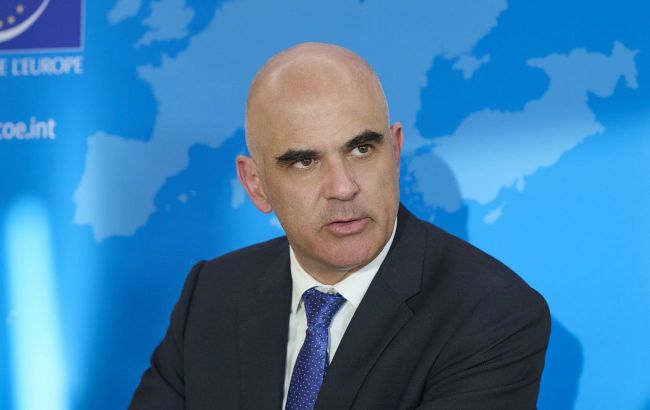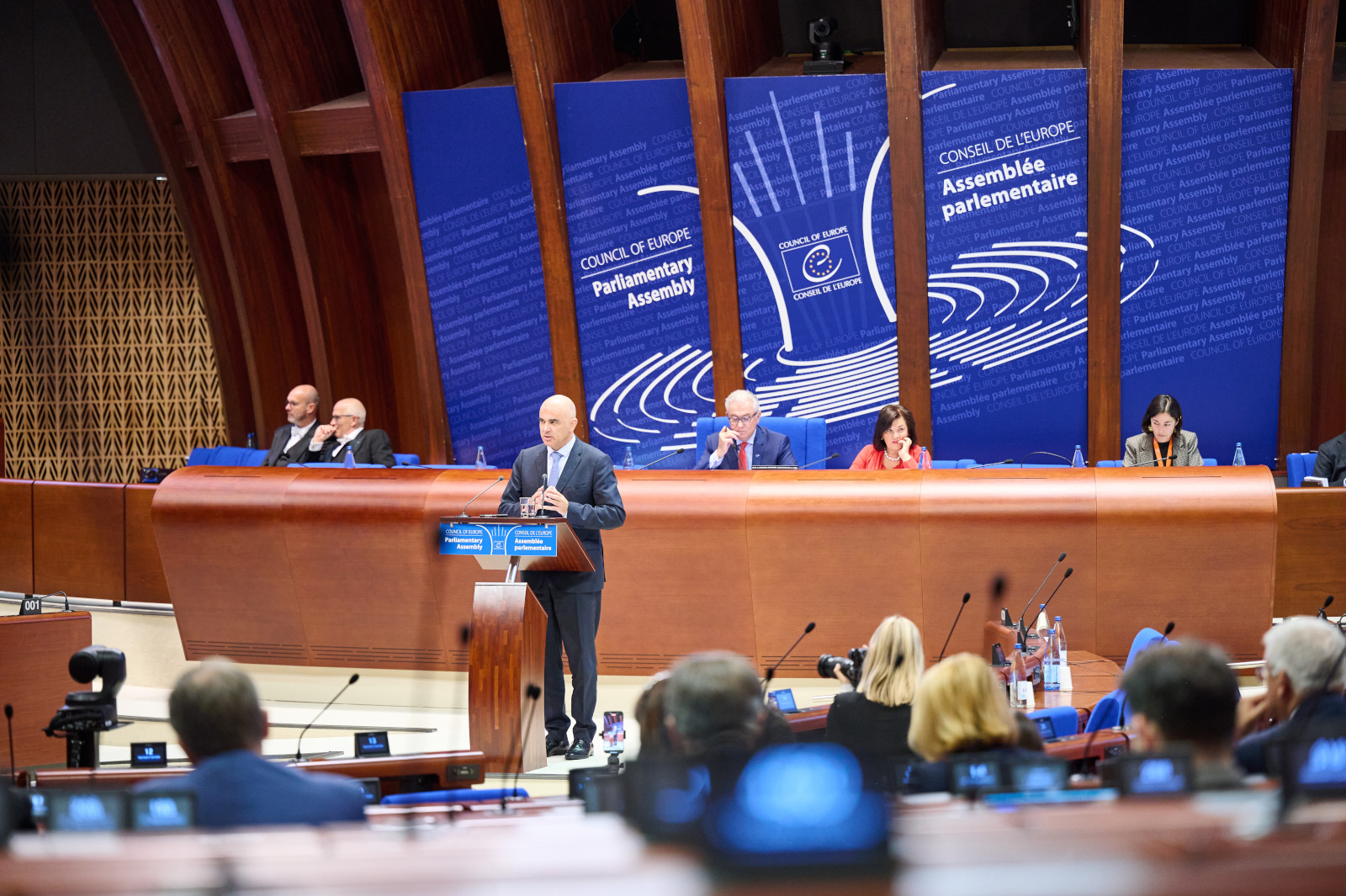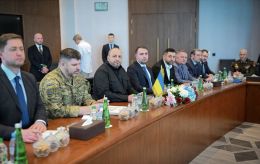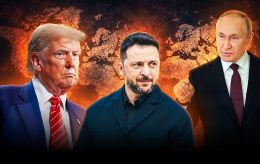Council of Europe SecGen Alain Berset: 'No possibility to stop the war until Russia's willing to make progress'
 Alain Berset, Secretary General of the Council of Europe (Council of Europe press service)
Alain Berset, Secretary General of the Council of Europe (Council of Europe press service)
Alain Berset, Secretary General of the Council of Europe, discusses the creation of a special tribunal to punish Russian aggression, the commission for compensating Ukrainians for damages, and Donald Trump's peace efforts in an interview with RBC-Ukraine.
Key questions:
- When will the Special Tribunal on Russian aggression against Ukraine begin its work?
- Where will the money come from to pay Ukrainians compensation for war damages?
- Why have efforts to end the war been unsuccessful?
As hopes for quick negotiations to end the war become increasingly illusory, work to hold Russia accountable for its aggression against Ukraine continues—slowly but steadily.
The Council of Europe has become a key platform in this regard. It already has an active Register of Damage Caused by Russian Aggression. An International Commission to examine Ukraine's claims is being prepared for launch. Behind-the-scenes work is continuing on the creation of a Special Tribunal to punish the Russian leadership for the war against Ukraine.
RBC-Ukraine spoke with Council of Europe Secretary General Alain Berset during a session of the Parliamentary Assembly of the Council of Europe, which has just supported a draft convention on the Commission for Compensation for Damages suggested by the CoE Committee of Ministers.
However, fundamental questions remain unanswered: where to get the money for potential compensation to Ukrainians for the damage caused. As Berset notes, several options are currently being considered: contributions from Council of Europe member states, the use of frozen Russian assets, etc. – although there is no clarity on this issue.
"I believe that just because we don't know exactly what the final destination will look like, we shouldn't stop our journey," Berset tells RBC-Ukraine, hoping that the commission will be able to start its work by the end of this year.
As for the Special Tribunal, where Ukrainians would certainly like to see Putin and his inner circle, the Secretary General of the Council of Europe is cautious in his time estimates and does not venture to predict when this might happen.
"Our Organization can’t deliver on everything. And we are not at the very centre of all discussions on how it works out in the end. What we can do is to prepare as far as possible all the building blocks for accountability. That will also be a part of the wider discussions," he replies to the question of how it is possible to simultaneously seek agreements with the aggressor and try to bring him to justice.
— Before we move on to discussing the activities of the Council of Europe in the context of Ukraine, I want to ask you about the most current events – the recent Russian attacks on Ukraine. Do all these attacks indicate that Russia has no intention to start real negotiations in the foreseeable future?
— It's terrible what's happening, and we can see that it is intensifying.
This is a time when we could have, at last, a ceasefire and then a discussion for a just and lasting peace for Ukraine. It's a very difficult situation. When I was in New York, we discussed this. We are following this in the Council of Europe really closely.
Not only because Ukraine is a member of the Council of Europe, not only because we are strongly dedicated to Ukraine, and that is our top priority. But Ukraine is also my personal top priority: we have Ukrainian people working here with us, and we have an office in Kyiv with some 100 people there. We are steadfastly at your side – as much as we can be. But we are not specialists, you know, in defence systems. We are the specialists in values, the rule of law, and accountability. That is what we are working towards.
We are continuing to deliver with our European Court of Human Rights. On a daily basis, we have a lot of cases of violations of human rights addressed to the Court and then decided by the Court. We have the work of the Register, and soon – of the Claims Commission, and we are working on opening the Special Tribunal.
I can remember what we expected during the winter, what would happen with the new US administration: peace in 24 hours. And everybody, including President Trump, is noting now that there is no possibility to stop the war while the will to really make progress is not there on the Russian side. It's very clear now. It's really difficult for me to predict what will happen.
.jpg) Alain Berset, Secretary General of the Council of Europe (Council of Europe press service)
Alain Berset, Secretary General of the Council of Europe (Council of Europe press service)
— I want to ask you about the Special Tribunal for the crime of aggression against Ukraine. What's happening with it right now? Because after the announcement of its creation, a few months ago, there has been literally no public news about it.
— What I can tell you is that we are working on this really hard. Let me tell you where we are now.
On June 25, President Zelenskyy visited Strasbourg. It was truly a very important moment for the Council of Europe, I think for Ukraine and for the whole European continent. But the most important point was to sign a bilateral agreement between the Council of Europe and Ukraine for the establishment of the Tribunal.
That was three months ago. In the meantime, we have launched an enormous amount of work. All the necessary preparation for the establishment of the tribunal is underway.
We are ready to activate an advance team to prepare all the necessary components for the Tribunal. I’m talking about the legal instruments, the infrastructure, staff. And we are trying now, and I hope it will be possible soon, to finance this first step, because we need finance from member states or from partners to make this work.
And then we will be ready. We are moving as fast as possible.
— May it happen next year?
— I don't know. It depends on the support of the states. And that's the point. That part of the equation is not in our hands.
We are putting forward a case. We are advocating for member states and non-member states to come with us. And it will be possible to set this in motion as soon as we have states engaging strongly in this direction, with the budget, and also with the ratification of the enlarged partial agreement that will allow the states to join.
That is exactly what needs to happen now. For our part, we are ready. We can go at the drop of a hat. But we need to have the support.
— Does 2026 look like a realistic timeframe?
— It's really difficult for me to predict when it's going to happen because it is not entirely in our hands.
But we have another area where it is going a bit smoother at the moment because it is something not totally new. That is the Claims Commission, which follows on from the Register of Damage. I can say, for the Claims Commission, it will take a few months to make the next step, because there is vigorous engagement from the member states of the Register.
We hope, and we are working in this direction, to have an agreement on establishing the Commission before the end of 2025.
— Where will the money come from to pay for all these compensations?
— That is exactly the discussion we need to have with member states. We must take this really seriously. The Register is already working very well, I would say.
We have, as we speak, some 60,000 claims submitted.
There will be 43 categories of claims ultimately. It's working very well, and your Prosecutor General expressed a big interest in working with the Council of Europe on the Register, because it could also play a role and make sense for Ukraine to be involved.
The idea of the Tribunal also sends a strong signal. The Summit of the heads of state, the heads of government was in May 2023. One year later, in spring 2024, there was the opening of the first registration. Now, in mid-2025, we have the agreement to establish the Claims Commission in the framework of the Council of Europe. And by the end of 2025, we want it up and running.
— But are you sure you'll still find enough money? Because we're talking about billions and billions of euros.
— It will be a discussion, a part of the discussion with the member states.
And as you may know, we have a lot of different ideas about how to finance this. There is a discussion about direct financing from member states. There is a discussion about investment from member states to see how it is possible to release funds to Ukraine.
And there is a discussion about frozen assets. Concerning frozen assets, what I know at the moment, it is not clear until now whether there will be an agreement between all the states concerned.
— How to use these frozen assets, for what?
— Exactly. Firstly, how can we ensure access to the money? And then the next step is how to use it?
In the discussions about the Claims Commission, we also need to address these issues. It is one thing to register damage. It is another thing to make the next step.
But I think that just because we don't know exactly what the destination looks like, we shouldn’t stop the journey. That's really important. We must go as far as we can, and we must tackle the issues and jump the hurdles when they come, and try to progress. I mean, that sounds really pragmatic, but it's the only way to really ensure movement.
 Alain Berset, Secretary General of the Council of Europe (Council of Europe press service)
Alain Berset, Secretary General of the Council of Europe (Council of Europe press service)
— How long will its work last, and the main question, which, surely, ordinary Ukrainians may be asking themselves in this context: when and under what conditions will we be able to see Putin behind bars?
— We should maybe start by asking why we are discussing the Special Tribunal. It is because we had a vote in the General Assembly of the UN, and 141 countries recognised what's happening in Ukraine as a crime of aggression.
So, the huge majority of the members of the UN recognised that we are facing a crime of aggression. But at the same time, there was a consensus about the fact that, despite the fact that this was recognised, we don't have a court or a tribunal with jurisdiction for dealing with the crime of aggression. That's why we have had to create the whole thing from scratch.
And the difficulty for us is that we need to create this without any past examples. I'm not able to tell you how it will be possible to take all those steps and what will happen when.
We need to make a strong commitment to say there must be accountability in general.
— And there will be in some future, right?
— There will be. And we are preparing for this. Never forget our court, the European Court of Human Rights, delivers accountability on an everyday basis. They make decisions.
We want to deliver more with this second pillar, the Claims Commission, which is the next step after the Register, and then the Special Tribunal. At that point, we will have a comprehensive framework for accountability.
— On the one hand, there are ongoing talks about some kind of negotiations with Russia, on the other hand, a process is being launched to punish its leaders for aggression. A very banal question: how can these two processes be combined – to negotiate with someone and at the same time try to punish him?
— It is an excellent question. I can't answer it. What I see is the role of the Council of Europe, and that is where we can deliver.
Our Organisation can’t deliver on everything. And we are not at the very centre of all discussions on how it works out in the end. What we can do is to prepare as far as possible all the building blocks for accountability. That will also be a part of the wider discussions.
And the point is, the further we can go, the more effective it will be for Ukraine.
— In your opinion, why have the peacekeeping efforts of Donald Trump's administration so far not led to any practical results? And in your opinion, are the United States, Ukraine, and Europe doing everything right?
— It's really difficult for me to answer this question. I just know how complicated it is. And if it is so difficult for the US, with the strong commitment of President Trump, as he made a very powerful commitment before taking office and also afterwards, even with the power that the U.S. has, with the power that the European Union has, it means that it must be really complicated and really difficult to stop the war.
Once again, that is not exactly where we can deliver the most. We are trying to concentrate on where we can make a difference, where we can add real value. And that’s on discussions on accountability.

